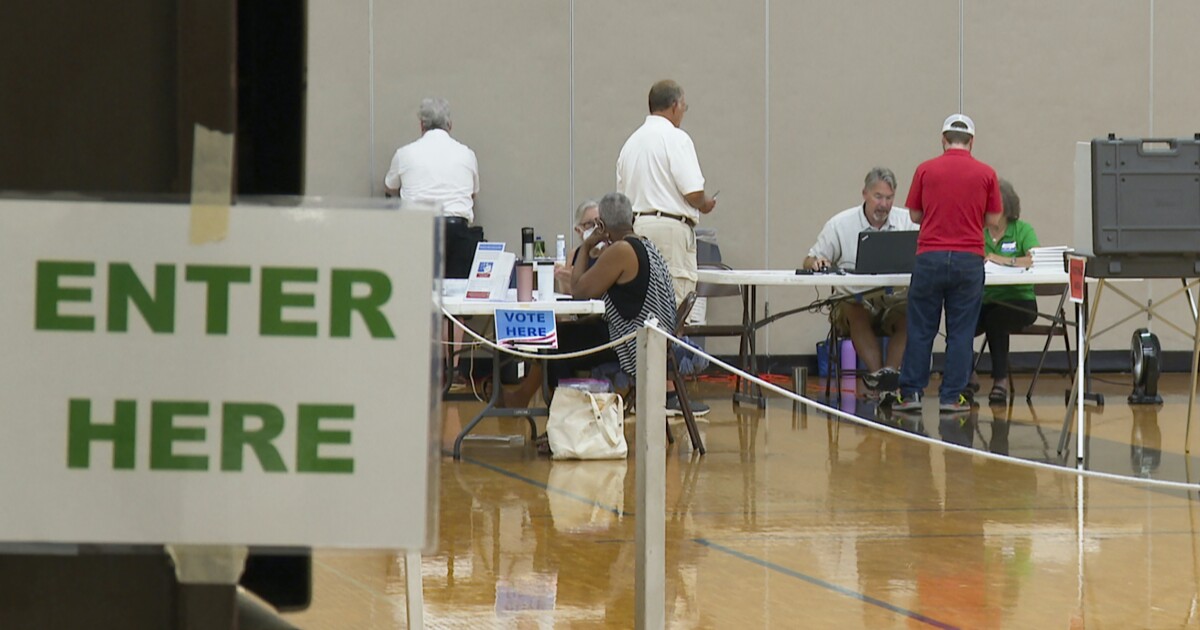

Corks are popping from apple cider bottles all over Michigan as the perennial Midwestern battleground celebrates its entry into the exclusive club of early presidential primary states and readies for the political spotlight in 2024.
The move is only applicable to the Democratic Party. Republicans are sticking to the traditional calendar that starts with Iowa, followed by New Hampshire, South Carolina, and Nevada. But political operatives and veteran activists on both sides of Michigan’s partisan divide are welcoming the decision, made at the behest of President Joe Biden, to place their state in a newly reordered and reshuffled group of five early primary battlegrounds.
“Folks are very excited,” Mark Brewer, a former Michigan Democratic Party chairman, told the Washington Examiner. “There’s a lot of talk about what this means in terms of seeing candidates and being an early state.”
The Democratic National Committee’s Rules and Bylaws panel voted last week to overhaul the party’s White House nominating calendar and include Michigan, voting fifth — on Feb. 27, 2024 — after South Carolina, Nevada, New Hampshire, and Georgia. The full voting membership of the DNC still has to approve the proposal, but minimal resistance is expected beyond delegates from New Hampshire, demoted in the order, and Iowa, jettisoned completely.
Meanwhile, to the extent Michigan Democrats need assistance from Lansing to facilitate the early primary, Gov. Gretchen Whitmer (D) and Secretary of State Jocelyn Benson (D), both reelected in landslides, are sure to deliver, as are incoming Democratic majorities in the legislature. Their help might be unnecessary, but its availability is significant. In Georgia, Secretary of State Brad Raffensperger (R) has expressed opposition to holding the Democratic and GOP primaries on separate days.
THE ‘TRUMP EFFECT’ DESTROYED REPUBLICANS THIS YEAR
But in Michigan, it’s not just Democrats cheering the state’s participation in the early state sweepstakes — which could benefit Whitmer should she ever run for president. Many Republicans, too, are pleased with the development, calling it great for the state and good for the country. Michael Meyers, a Republican consultant in Grand Rapids, said Michigan’s political, demographic, ethnic, racial, religious, economic, and geographic diversity make it perfect for vetting presidential contenders.
“Michigan really has it all — for both parties,” he said. “We have great and meaningful political regions with great traditions that the press will love to cover.”
Ron Fournier, former Washington bureau chief for the Associated Press, agrees.
Fournier spent several presidential campaigns trekking through Iowa, New Hampshire, and South Carolina, covering Democratic and Republican candidates before returning to Michigan, his home state, to work in local journalism and consulting. Among the advantages offered by those states are electorates highly engaged in politics — they will show up to dozens of campaign events and town hall meetings every four years to meet the contenders and ask pointed questions.
Fournier said Democrats will find that to be the case in Michigan.
“I love Iowa and New Hampshire; I covered primaries there for years. But this is a very engaged population. It’s been a battleground state for generations,” Fournier said. “Anybody who thinks Michigan voters aren’t going to be as serious about presidential politics as Iowa is drastically misreading [Michigan] voters.”
Michigan political observers argue their state better represents a cross section of the United States than the traditional early primary states.
The benefit, they say, is that the issues candidates will address, and policies they will propose to woo Michigan voters, will travel better in ensuing primary contests and the general election. For example, Michigan is a major manufacturing hub for domestic and global corporations. The state is a major trade corridor via the busiest Canadian border crossing in the U.S. Plus, with proximity to the Great Lakes, Michigan is at the forefront of dealing with environmental issues.
Additionally: Demographically, there is a large and thriving black population, growing Arab and Muslim blocs, plus long-established communities of white voters of Chaldean, Dutch, Finnish, Greek, Irish, Italian, Lithuanian, Macedonian, Polish, Scandinavian, and Ukrainian descent. Michigan also offers a rich array of urban, exurban, suburban, and rural communities, as well as college campuses, where candidates can test-market their messaging and style with the sorts of voters they will need to appeal to in order to win the White House.
Michigan might not have won the DNC’s backing to become a new early state without Biden’s prodding. The national party’s determination to dethrone Iowa after the botched 2020 caucuses and create a calendar better reflective of its committed voting base certainly had something to do with it. But getting to this point was a priority for Rep. Debbie Dingell (D-MI) and had been a pet project of hers for years.
“Two small states — New Hampshire and Iowa — dominate the presidential nominating system,” Dingell told Fox News in 2020. “They don’t reflect the diversity of the country. They don’t reflect the very diverse issues that everybody cares about. And I think that we need a system where presidential candidates are going to far more states.”
Mission accomplished. But not all Michigan politicos are cheering.
Part of the sales pitch for including Michigan as an early state is that pragmatic politics is more effective in the state than catering to the insurgent wings of either party. Biden’s narrow victory over former President Donald Trump in Michigan in 2020, and the outcome of the 2022 midterm elections in the state, lend support to that claim. In theory, Michigan voting early could help Democrats nominate more electable general election candidates — in 2024 and beyond.
CLICK HERE TO READ MORE FROM THE WASHINGTON EXAMINER
Some political veterans worry base politics will overcome pragmatism as White House contenders seek to outflank rivals in the primary, reshaping the Michigan Democratic Party in the process — and for the worse. Dave Waymire, a political consultant and former Michigan politics reporter, said Republicans in the state have for years been suffering from a similar affliction, one he traces back to the 1988 Republican presidential primary.
That year, Michigan Republicans were awarding their nominating delegates through votes cast at a state convention. Pat Robertson, running an insurgent campaign against then-Vice President George H.W. Bush, the establishment front-runner, used the convention to marshal the support of grassroots conservatives. The character of the Michigan Republican Party was forever altered by that campaign, Waymire contends, warning the same could be about to happen to the Democrats.
“What happens if [Sen.] Bernie Sanders [I-VT] decides to come in and this is not a Biden lovefest, and suddenly, you have a state that’s really divided?” Waymire said. “Wanting to be first risks bringing in a whole bunch of new people that does not inure to the benefit of the party.”
Marisa Schultz contributed to this report.







